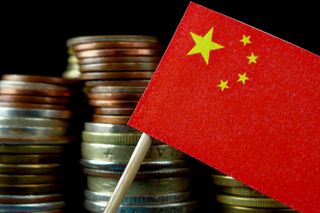China's Central Bank Says its Digital Currency Is Ready

The People's Bank of China (PBOC) announced Saturday that its central bank digital currency (CBDC) "can now be said to be ready," according to The Block, which reported that China's central bank has been working on this digital currency project since 2014. Just don't expect it to catch on right away.
China's work on its own digital currency might seem odd, given its less-than-friendly stance on cryptocurrency. The country's regulators have considered banning cryptocurrency mining, but some analysts believed that was merely part of China's efforts to increase its control over its cryptocurrency market. Introducing a digital currency of its own--even if it's not a true cryptocurrency--might help the country reduce the appeal of coins outside its control.
The CBDC is said to be partially reliant on the same blockchain technology used by cryptocurrencies like Bitcoin, Ethereum, and the upcoming Libra coin from Facebook. (Assuming the company's ability to convince U.S. regulators that it can be trusted with a currency of its own.) The Block said it'd not built completely on blockchain, though, because the PBOC wanted to ensure the currency had enough throughput to keep up with retail usage.
The Block also said that Mu Changchun, a deputy chief in the PBOC's Payment and Settlement Division, explained CBDC's two-tier structure. "The People’s Bank of China is the upper level and the commercial banks are the second level," he said. "This dual delivery system is suitable for our national conditions. It can use existing resources to mobilize the enthusiasm of commercial banks and smoothly improve the acceptance of digital currency."
Introducing a new currency is no small feat, however, which is probably why it's taken five years for the PBOC to bring this project out of the R&D stage. Convincing other banks to adopt the currency should be relatively easy; figuring out how to manage the introduction of this currency in a global economy is likely to be harder. Rolling out a digital currency isn't the same as finding a new way to digitally manage existing currencies, after all.
The PBOC and its partners were reportedly well-aware of these challenges. Both parties recognized during Saturday's announcement that China is a massive country whether it's being measured by population, landmass, or financial standing. Relying on a two-tier structure is supposed to help, but don't be surprised if the five years that CBDC spent in development are matched by another five years struggling to gain traction in the country.
Still, we know at least one person who should be excited about Saturday's announcement, and that's Huawei CEO Ren Zhengfei. He recently told L'Economia that he wanted China to introduce a digital currency of its own so it wouldn't have to wait for the likes of Libra. This currency faces a lot of obstacles on its path to relevancy, but at least Zhengfei doesn't have to worry about Facebook beating China's own government to market.
Stay on the Cutting Edge
Join the experts who read Tom's Hardware for the inside track on enthusiast PC tech news — and have for over 25 years. We'll send breaking news and in-depth reviews of CPUs, GPUs, AI, maker hardware and more straight to your inbox.

Nathaniel Mott is a freelance news and features writer for Tom's Hardware US, covering breaking news, security, and the silliest aspects of the tech industry.
-
AnimeMania If you can't beat 'em, ban 'em. I wonder if this digital currency has a cryptomining component, because that wastes tons of natural resources while providing little benefit.Reply -
I don't really see how this "digital currency" is any different from having a bank account and transferring money to another person's bank account.Reply
At the very least, it should be much less wasteful than cryptocurrency as they currently exist. -
bloodroses ReplyAnimeMania said:If you can't beat 'em, ban 'em. I wonder if this digital currency has a cryptomining component, because that wastes tons of natural resources while providing little benefit.
More than likely not in regards to cryptomining. My guess is it is similar to or based on Ripple; like what Japan has been doing.
https://cointelegraph.com/news/japan-13-banks-invest-in-sbis-ripple-powered-blockchain-payment-app -
Giroro "it'd not built completely on blockchain, though, because the PBOC wanted to ensure the currency had enough throughput to keep up with retail usage. "Reply
Well, that, and because China's communist dictator needs his servers in the mix to be able to record every single transaction, in order to track and prosecute those who are unloyal to their great leader. -
manisharma11211 Thanks for this information. Also dig into cc generator v2.0 to get related information about this.Reply
Most Popular



